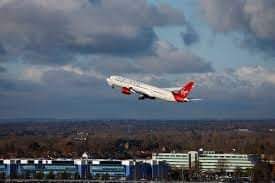Virgin Atlantic airlines flies transatlantic with engines powered by cooking oil
Virgin Atlantic this week recorded a milestone, operating the first transatlantic jetliner powered by Sustainable Aviation Fuel (SAF) made from cooking oil.
The airline operated the flight from London’s Heathrow to New York’s JFK airport with a Boeing 787 Dreamliner. Virgin founder, Sir Richard Branson, Transport Secretary Mark Harper and Virgin Atlantic chief executive Shai Weiss, were among the passengers on the flight. The flight did not charge fares.
A delighted Branson said: “The world will always assume something can’t be done, until you do it. The spirit of innovation is getting out there and trying to prove that we can do things better for everyone’s benefit.
“Virgin Atlantic has been challenging the status quo and pushing the aviation industry to never settle and do better since 1984,” he said. The Transport Secretary added that today’s 100 per cent SAF-powered flight shows how the world could decarbonise transport both now and in the future, cutting lifecycle emissions by 70 per cent and inspiring the next generation of solutions.
“This Government has backed today’s flight to take off and we will continue to support the UK’s emerging SAF industry as it creates jobs, grows the economy and gets us to jet zero,” Harper said.
Asked whether the greenest option would be for the flight not to take off, he told BBC Breakfast “people want to fly and this Government wants to make sure they can continue doing so, but in a way that delivers on our environmental provisions”.
The British Civil Aviation Authority analysed various aspects of Virgin Atlantic’s planned flight before granting the operating permit, including undertaking ground testing with an engine running on 100 per cent SAF.
CAA chief executive, Rob Bishton, said: “As the UK’s aviation regulator, it’s important that we safely enable the industry to embrace more sustainable practices and push the boundaries of what’s possible to create a greener aviation industry.
“This permit not only allows Virgin Atlantic and others to showcase their commitment to sustainability, but also serves as an example of how the industry is always exploring new technologies.
“Innovation and sustainability are vital areas of work, but they must go hand in hand with safety. This is a reminder that together we can drive change, reduce emissions and make the skies greener for generations to come.”
SAF is seen as vital to reduce the aviation industry’s carbon emissions but is currently much more expensive to produce than conventional jet fuel.
It makes up only about 0.1 per cent of aviation fuel used globally.
SAF is made from sustainable sources such as agricultural waste and used cooking oil, meaning its production involves using about 70 per cent less carbon.
It can be used in jet engines to a maximum blend of 50 per cent with kerosene without the need for any modifications.
Virgin Atlantic was awarded up to £1 million by the government in December last year to plan and operate the flight to demonstrate the effectiveness of SAF.
American company, Gulfstream Aerospace, operated the first transatlantic flight powered by 100 per cent SAF earlier this month using a business jet.





